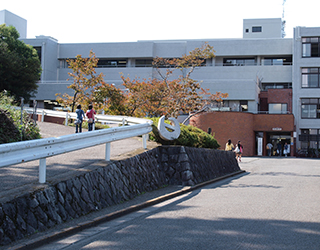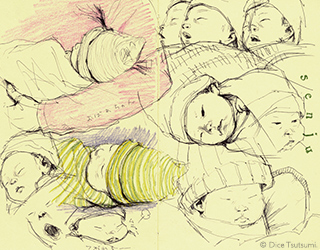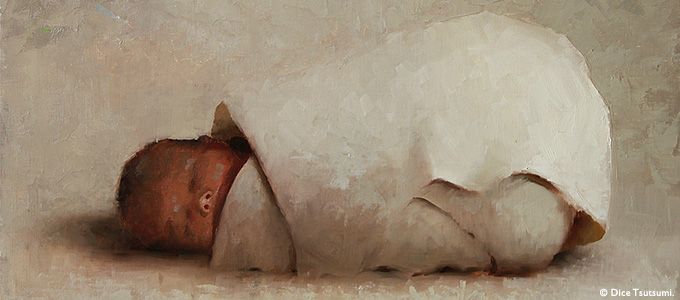
Carrying the Torch of Freedom
In the Tsutsumi household it was his mother’s rule that the child must leave home at eighteen years of age. Mr. Tsutsumi abided and went off to study abroad after graduating from high school. As common as it is in Western culture, it is still a rare home policy for Japan. His mother, who was not authoritarian at all in her childrearing style, had a specific determination; choosing a school environment where her children could be taught their “freedom.”
“My parents divorced when I was five. While running her own company, my mother raised my sister* and I all by herself and without any support from our father. She had made an unyielding decision to put us through the entire Wako Gakuen private school of Machida City, Tokyo, because of its prominence in peaceful and libertarian educational policies. Socially, the 80’s were completely a male-dominant era, so I think she really struggled. Today I have nothing but words of gratitude towards her.”
“The attribute of Wako Gakuen’s education was ‘Make them think without giving them answers.’ Think for yourself, and if your opinion differs from others, then talk it through as long as it takes. That was their attitude. They put such emphasis in discussions. If a student had a question or a problem, it was common to stop class and debate for the rest of the day. It was more important to say your own opinion clearly, than to make good grades on a test. The school didn’t force the students into things like sports or studying. We even made our own textbook once! It was such an interesting school, I would like my own child to attend it, if I lived in Japan.”

“If good grades were all that was required, eventually you may lose a fundamental part of yourself. If that remains the only measurement for success, then in a competitive society, it is natural and inevitable that some people become ‘failures.’ On the otherhand, when we are allowed to think until the true essence of a subject becomes tangible, we are enabled to know where our own values lie. That helps us see our real self. Looking back, I feel so lucky that I was empowered to do so at Wako, and went on to find something I can put all my heart into. Most of my classmates are also creators, designers, musicians, entrepanuers, and somehow ‘derailed’ from society. (laugh) Of course, deciding whether that is a good thing or a bad thing is up to the individual.”
He grew up in an educational environment that emphasized freedom. He completely skipped out on entrance exams (which is the great token of Japanese education). He put all of his time and attention to playing baseball. Then one day an unexpected incident happened. The early 90’s bubble burst, a huge economic crisis of Japan was upon them, and his mother’s company folded.
“We were supposedly in a very tight place, but I had no idea. She must have been so desperate, but she didn’t even show it. I think she was trying not to worry us. In the end, my mother was in huge debt, and going to university or studying abroad seemed impossible. But my mother insisted that, of all things, she wanted that dream to come true for me. So she told me not to worry, and sent me off to school in the US. I thought she was an unbelievable person.”
“That is why I think my sister and I worked so hard once we got to New York. When I thought of my mother’s wish, I couldn’t waste a single moment, and I had no time to fool around in college. Especially my sister, who had never studied with much discipline, was so determined. After graduating high school and going to City College in New York City, she studied extremely hard to major in International Relations. I don’t think her grades were that great in college either, but she was persistent and was able to graduate.”

“We can look back now and say that she has published a number of bestselllers as an international journalist. But her success didn’t come until her late 30s. Until then she was making ends meet with other jobs… and I assume it was dire times for her from a societal standpoint and also financially. But because she was able to find something she truly enjoyed, I think she was happy the whole time going through her prolonged struggle that brought no results.”
By overcoming predicaments, each child captured their dreams. And last year a grandchild was born. Senju, Mr. Tsutsumi’s first son. Seeing her mother absolutely smitten with her grandson took him by surprise. Ever since he could remember, he watched his mother busily attending to her work. So this must have looked very fresh and “motherly” to his eyes. Simultaneously, when he reflects on the definition of “fatherly,” he is not only focused on his own child in front of him, but thinks about the whole generation to come.
“I assumed I would change when I had a child. But I am not sure that had much to do with ‘becoming a father.’ My father left our home when I was five, and although I saw him many times, he was never a ‘fatherly’ person. So, I don’t hold an image of a father in me. Rather, what I started thinking when my son was born was ‘how much time do I have left before I die?’”
“This is not at all a negative notion, it’s just that I have started to feel that the time of my child’s future is more important than mine. I think that is instinctive. What can I leave behind for the next generation while I am still alive? When a child is born, I feel like that feeling gets stronger and heavier.”
“Compared to the history of mankind, our own life story is so miniscule. I don’t think humankind can survive much longer if we can’t instinctively hope for and leave behind the best environment for our children to lead a fulfilling adulthood. We need to free ourselves from ego and desires that distract us and use our given ability for the coming generations - that, is what’s meaningful. With that said, I want to make sure we do the same in filmmaking.”
* Ms. Mika Tsutsumi: Journalist and author known for her U.S. socio-political jounalism.

